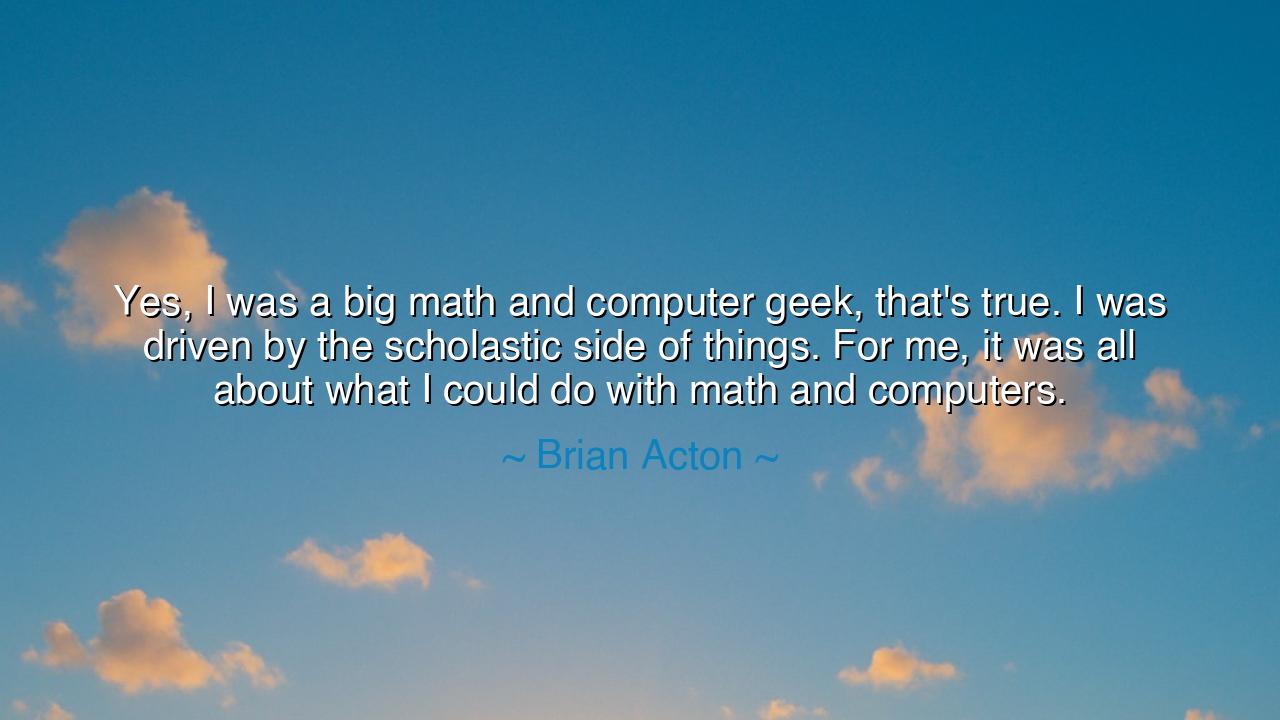
Yes, I was a big math and computer geek, that's true. I was
Yes, I was a big math and computer geek, that's true. I was driven by the scholastic side of things. For me, it was all about what I could do with math and computers.






In the vast landscape of human progress, where the quest for knowledge and innovation has shaped our civilizations, there are those who rise not merely from the pursuit of glory, but from the deep, almost mystical connection to the tools of learning and discovery. Brian Acton, one of the pioneers of the digital revolution, once confessed, “Yes, I was a big math and computer geek, that’s true. I was driven by the scholastic side of things. For me, it was all about what I could do with math and computers.” These words, simple yet powerful, speak to the heart of the human drive for understanding and the inexorable pull of curiosity that leads one to explore not just the world around us, but the very systems that underlie all things.
In the ancient world, the quest for knowledge was often seen as a divine calling. Pythagoras, the great mathematician and philosopher of ancient Greece, is said to have dedicated his life to understanding the mystical properties of numbers, seeing them as the key to understanding the cosmos itself. Mathematics, to him, was not merely a tool for counting, but a pathway to unraveling the secrets of the universe. His devotion to this pursuit of truth through numbers mirrors Acton’s own drive, where the beauty of math and the power of computers became the lens through which he viewed the world. Just as Pythagoras saw numbers as more than abstract symbols, Acton recognized the profound potential of computers to reshape and transform our lives.
Yet, unlike the philosophers of antiquity who often searched for universal truths, the mathematicians and computer scientists of the modern world are often driven by the practical power of their creations. Acton, in his humble recognition of his own obsession with math and computers, understood that the true gift of these tools lay not in mere theory, but in their ability to solve real-world problems. This mirrors the work of Archimedes, whose pursuit of mathematical truths led to practical inventions like the Archimedean screw, which was used for irrigation. Archimedes, like Acton, understood that the beauty of mathematics was in its application, in the tangible ways it could improve the world around him. Acton’s journey, like that of the ancient minds, was not driven by the desire for fame or riches, but by a passion for what math and technology could achieve.
As Plato once posited in his work The Republic, knowledge should be sought not for personal gain but for the greater good—to shape the soul and the society around us. In this vein, Acton’s words reflect a modern iteration of that ancient ideal: the pursuit of knowledge not for its own sake, but for the impact it can have on society. Through his work, particularly with WhatsApp, Acton sought to create a tool that could connect people across vast distances, transcending the barriers that have long kept humanity separated. His focus on the practical application of math and technology mirrors the ideals of the ancient philosophers, who sought not just to understand the world, but to use that understanding to shape a better future.
In the same way that Aristotle saw virtue as the result of knowledge and practice, Acton’s drive towards solving real-world problems through math and computers highlights the inherent connection between learning and doing. Aristotle believed that knowledge was not enough in itself; it had to be applied to live a virtuous life. Acton, by dedicating himself to the practical use of his knowledge, sought not just to understand computers and math, but to transform them into tools that could bring about real change. The scholastic drive he felt—the desire to understand, to improve, and to apply—echoes the ancient pursuit of wisdom for the benefit of others.
The lesson in Acton’s journey is one of purpose and dedication. He did not follow the traditional path of wealth or fame, but instead found his calling in the quiet and focused pursuit of knowledge. The story of Acton and his colleagues shows that true fulfillment comes not from external accolades, but from dedicating oneself to a craft, to a field of study, and to the impact that knowledge can have on the world. It is a lesson for all of us, reminding us that we, too, have a duty to pursue knowledge not just for personal gain, but for the greater good, to make a tangible difference in the world.
In practical terms, the action we can take is to pursue our own passions with dedication and focus. Just as Acton honed his skills in math and computers, we must cultivate the skills that are uniquely ours—whether in science, art, or humanities—and find ways to apply them to real-world challenges. The modern world demands not just knowledge, but the ability to use that knowledge to create, to build, and to improve. Let us remember that in every pursuit, it is not the end that defines us, but the journey, the relentless drive to use our gifts in ways that benefit others. Just as the ancients sought to understand the world to better it, so too must we apply our own knowledge to build a better world.






AAdministratorAdministrator
Welcome, honored guests. Please leave a comment, we will respond soon